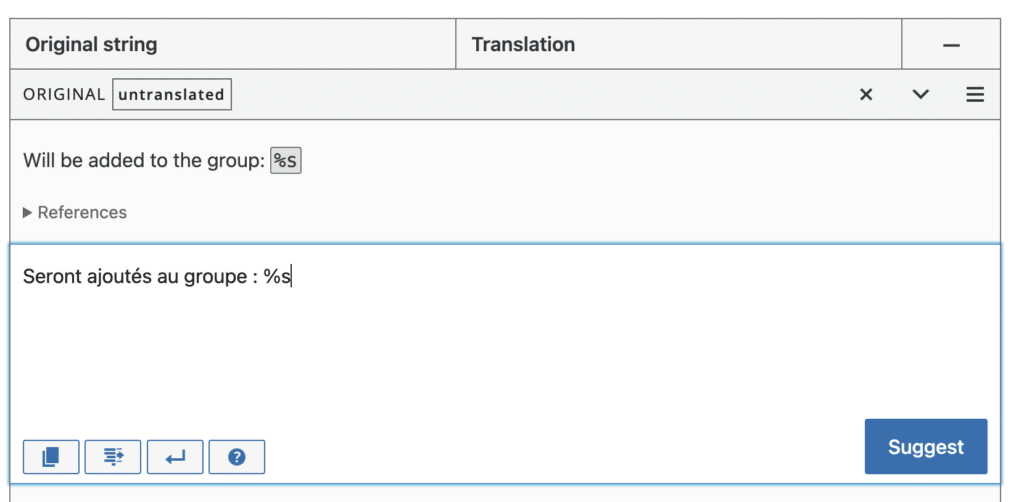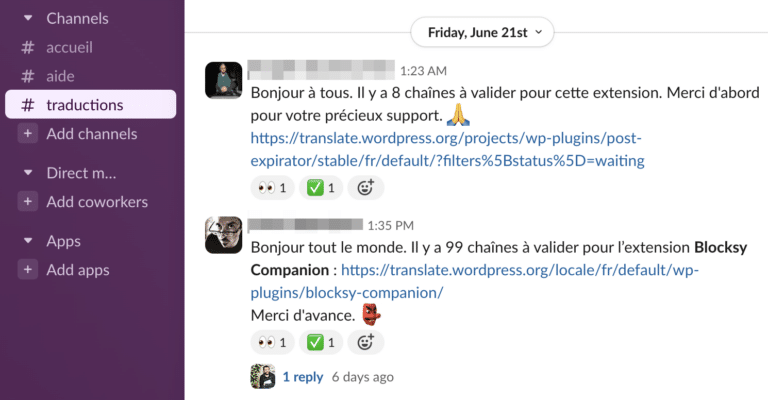How do texts get translated for Joomla?
We initially included translations shared by the community in AcyMailing, but we lacked the knowledge to accurately judge the quality of the shared texts.
We thus have a new way of handling translations that benefits both Joomla and WordPress users, while ensuring the quality of the translations:
– The translations are first added by the Joomla and WordPress community on this page
– These translations are checked and approved by the translation team of each country
– When a new version of AcyMailing is released, we import the translations from WordPress to our Joomla translation files
This way, the translations are shared between Joomla and WordPress users, and the quality is ensured by the WordPress translation teams.
How to contribute?
First of all, thank you for wanting to improve the translation of AcyMailing!
If you want to help improve the translation for your locale, you can follow these next steps.
Where can I add my translations?
In the table bellow, you can search for your locale, and find its translation page by clicking the percentage in the “Translation” column.
| Locale | Translation | Listing translation | Review team |
|---|---|---|---|
| Korean | |||
| French (France) | |||
| Ukrainian | |||
| Russian | |||
| Spanish (Spain) | |||
| Dutch | |||
| Lithuanian | |||
| German (Formal) | |||
| German | |||
| Romanian | |||
| Dutch (Belgium) | |||
| Czech | |||
| Italian | |||
| Norwegian (Bokmål) | |||
| French (Canada) | |||
| Japanese | |||
| English (UK) | |||
| Swedish | |||
| Greek | |||
| Polish | |||
| Portuguese (Portugal) | |||
| Turkish | |||
| Danish | |||
| Slovak | |||
| Galician | |||
| Portuguese (Portugal, AO90) | |||
| Croatian | |||
| Vietnamese | |||
| Spanish (Mexico) | |||
| Catalan | |||
| Slovenian | |||
| French (Belgium) | |||
| Portuguese (Brazil) | |||
| Chinese (China) | |||
| Latvian | |||
| German (Austria) | |||
| German (Switzerland) | |||
| Chinese (Taiwan) | |||
| Bulgarian | |||
| Hungarian | |||
| Finnish | |||
| Hebrew | |||
| Arabic | |||
| Macedonian | |||
| Urdu | |||
| Swahili | |||
| Persian | |||
| Serbian | |||
| Catalan (Balear) | |||
| Bosnian | |||
| Algerian Arabic | |||
| Estonian | |||
| Indonesian | |||
| Icelandic | |||
| Thai | |||
| Afrikaans | |||
| Welsh | |||
| English (Australia) | |||
| Tamazight (Central Atlas) | |||
| Chinese (Hong Kong) | |||
| Shqip (Kosovo) | |||
| Tahitian | |||
| Picard | |||
| Sakha | |||
| Spanish (Chile) | |||
| Spanish (Colombia) | |||
| Esperanto | |||
| Spanish (Argentina) | |||
| English (South Africa) | |||
| English (New Zealand) | |||
| English (Canada) | |||
| Norwegian (Nynorsk) | |||
| Spanish (Costa Rica) | |||
| Ossetic | |||
| Spanish (Dominican Republic) | |||
| Portuguese (Angola) | |||
| Spanish (Ecuador) | |||
| Shona | |||
| Spanish (Guatemala) | |||
| Syriac | |||
| Spanish (Honduras) | |||
| Tagalog | |||
| Maltese | |||
| Wolof | |||
| Malay | |||
| Spanish (Peru) | |||
| Ewe | |||
| Marathi | |||
| Spanish (Puerto Rico) | |||
| Nepali | |||
| Spanish (Uruguay) | |||
| Occitan | |||
| Spanish (Venezuela) | |||
| Papiamento (Aruba) | |||
| Basque | |||
| English (Pirate) | |||
| Persian (Afghanistan) | |||
| Romansh | |||
| Faroese | |||
| Sinhala | |||
| Fon | |||
| Somali | |||
| Arpitan | |||
| Swati | |||
| Fulah | |||
| Tamil | |||
| Friulian | |||
| Tajik | |||
| Frisian | |||
| Turkmen | |||
| Irish | |||
| Uzbek | |||
| Borana-Arsi-Guji Oromo | |||
| Yoruba | |||
| Scottish Gaelic | |||
| Zulu | |||
| Gujarati | |||
| Dzongkha | |||
| Haitian Creole | |||
| Mongolian | |||
| Hausa | |||
| Maori | |||
| Hawaiian | |||
| Myanmar (Burmese) | |||
| Hazaragi | |||
| Dutch (Formal) | |||
| Hindi | |||
| N’ko | |||
| Upper Sorbian | |||
| Oriya | |||
| Armenian | |||
| Panjabi (India) | |||
| Igbo | |||
| Papiamento (Curaçao and Bonaire) | |||
| Ido | |||
| Nigerian Pidgin | |||
| Javanese | |||
| Pashto | |||
| Georgian | |||
| Rohingya | |||
| Karakalpak | |||
| Sanskrit | |||
| Kabyle | |||
| Sicilian | |||
| Greenlandic | |||
| Saraiki | |||
| Kinyarwanda | |||
| Sindhi | |||
| Amharic | |||
| Albanian | |||
| Kazakh | |||
| Sardinian | |||
| Khmer | |||
| Sundanese | |||
| Kurdish (Kurmanji) | |||
| Silesian | |||
| Kannada | |||
| Tamil (Sri Lanka) | |||
| Luxembourgish | |||
| Telugu | |||
| Limburgish | |||
| Tigrinya | |||
| Ligurian | |||
| Tatar | |||
| Lingala | |||
| Tweants | |||
| Lombard | |||
| Uighur | |||
| Lao | |||
| Venetian | |||
| Luganda | |||
| Xhosa | |||
| Maithili | |||
| Tamazight | |||
| Montenegrin | |||
| Chinese (Singapore) | |||
| Lower Sorbian | |||
| German (Switzerland, Informal) | |||
| Cornish | |||
| Kurdish (Sorani) | |||
| Dhivehi | |||
| Cebuano | |||
| Catalan (Valencian) | |||
| Breton | |||
| Corsican | |||
| Tibetan | |||
| Bengali (India) | |||
| Bhojpuri | |||
| Bodo | |||
| Belarusian | |||
| Balochi Southern | |||
| South Azerbaijani | |||
| Bengali (Bangladesh) | |||
| Azerbaijani (Turkey) | |||
| Azerbaijani | |||
| Assamese | |||
| Bashkir | |||
| Moroccan Arabic | |||
| Emoji | |||
| Mauritian Creole | |||
| Asturian | |||
| Malagasy | |||
| Malayalam | |||
| Kyrgyz | |||
| Aragonese |
How to add a translation?
On the translation page will be listed the strings that don’t have any translation yet.
You can add your own text based on the English version (even 10 lines help a lot!).
Once you’re satisfied, you can click que “Suggest” button. Here is an example translating a text in French:

Note that for common texts, there can be some suggestions taken from other plugins shown below the text zone to help you.
If you want to help us, you can also take a look at the translations of the AcyMailing listing to help it get found by more people 🙂
How to ask for a translation review?
The first time you add translations, they are added as suggestions and need to be approved to be available for everyone. After some time, the review team may grant you permission to auto-approve your own translations (each review team has their own rules on this).
Asking for a review should be the same process for each language:
First join the locale’s slack using the link in the table above. If it requires a @chat.wordpress.org email address, use your wordpress.org username, for example myaccount@chat.wordpress.org.

You can then search for the channel where reviews are asked (usually called “#translation” or “#en_gb” for example). Here is an example for the French slack server:

You can notice that people asking for reviews add the link to the corresponding translation page, this is to make life easier to reviewers.
Someone should respond some time after they reviewed your translations. Don’t hesitate to send us a message when your translation is approved 😉
read also : How to create a newsletter on WordPress



